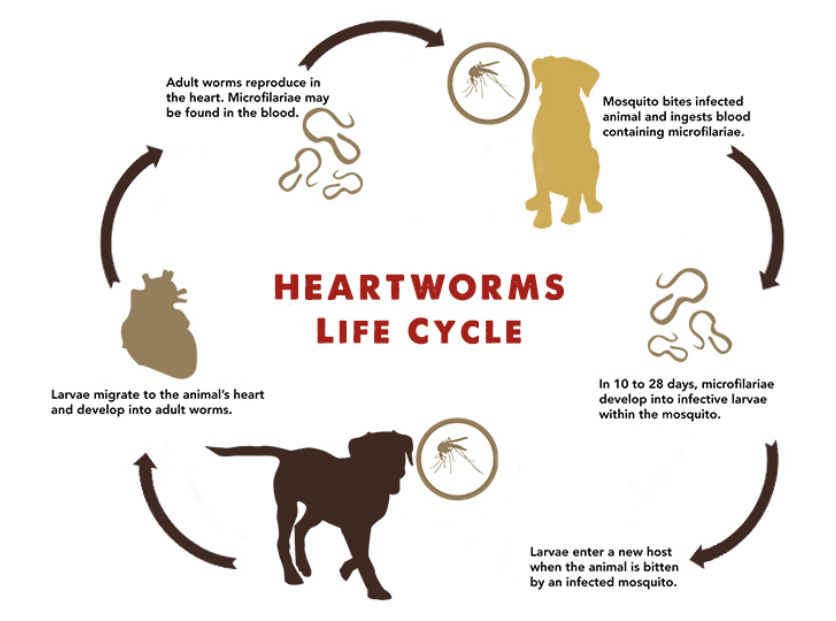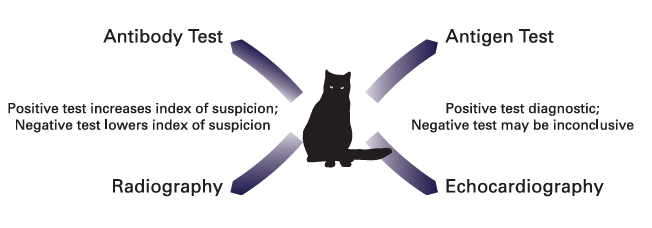Heartworm Disease Diagnosis and Prevention: A Veterinary Authority Guide
Heartworm disease is a serious and potentially fatal disease that widely affects the health of dogs and cats. As veterinary professionals, we know that the principle of "prevention first, diagnosis is key" is essential. This guide aims to provide you with heartworm disease diagnosis and prevention information based on the latest authoritative recommendations, and introduce how Tashikin supports your clinical work and protects the health of every life through accurate and reliable diagnostic tools.
What is Heartworm Disease?
Heartworm disease is caused by a parasitic nematode called *Dirofilaria immitis*. This parasite is mainly transmitted through the bites of infected mosquitoes.

Adult worms mainly parasitize the heart, pulmonary arteries, and related large blood vessels of dogs, cats, and other mammals. The presence of worms can seriously damage the host's cardiovascular system and lungs, causing inflammatory reactions, leading to thickening of the vascular intima, vascular obstruction, pulmonary hypertension, and ultimately heart failure or even death.
Canine Heartworm Disease
Symptoms (Symptoms)
The severity of clinical symptoms of canine heartworm disease is related to the number of worms infected, the duration of infection, and the dog's activity level.
- Early/Mild Infection:May have no obvious symptoms or only a slight cough.
- Moderate Infection:Cough (especially after exercise), exercise intolerance, shortness of breath.
- Severe Infection:Persistent cough, difficulty breathing, lethargy, weight loss, fainting, ascites (caused by right heart failure). In severe cases, Caval Syndrome may occur, manifested as acute collapse, respiratory distress, hemoglobinuria, requiring emergency surgery.
Diagnosis (Diagnosis)
Accurate diagnosis is the basis for developing effective treatment and prevention strategies. The American Heartworm Society (AHS) and the Companion Animal Parasite Council (CAPC) recommend combining multiple methods for diagnosis.
Antigen Testing (Antigen Testing)
Antigen testing is currently the most commonly used method for diagnosing canine heartworm disease. It mainly detects antigens from the uterus of mature female adult worms. Most commercial antigen test kits use ELISA or immunochromatography technology.
Tashikin CHW Ag Test Kit
Advantages:The Tashikin CHW Ag Test Kit uses advanced immunochromatography technology to provide you with a fast (results usually within 10 minutes), accurate (high sensitivity and specificity) and easy-to-use testing solution.
Applicable Scenarios:Annual routine screening, clinical suspected case diagnosis, pre-treatment confirmation of infection, post-treatment evaluation.
Key Points of Operation:Only a small amount of whole blood, serum or plasma sample is required, and the operation steps are simple and clear.
Limitations:Antigen testing may not detect early infections (adult worms have not yet matured), male-only infections, or cases with very low worm burdens. In these cases, false negative results may occur.
Microfilaria Testing (Microfilaria Testing)
Detects the presence of circulating microfilariae (larvae of heartworms) in the blood. Common methods include direct blood smear microscopy and concentration techniques such as the modified Knott's method or filtration method.
Significance:A positive result can confirm heartworm infection and indicate that the dog is a potential source of infection. Testing microfilaria status before treatment helps guide the selection of treatment plans.
Importance:Approximately 20% of antigen-positive dogs may test negative for microfilariae (occult infection). Therefore, the AHS recommends combining antigen testing and microfilaria testing to improve the accuracy of diagnosis.
Antibody Testing (Antibody Testing)
Antibody testing has limited application in the diagnosis of canine heartworm disease because it can only indicate that the dog has been exposed to heartworm larvae, and cannot distinguish between current infection, previous infection, or only exposure without infection. It is mainly used for the auxiliary diagnosis of feline heartworm disease.
Imaging Examination
Chest X-rays and echocardiography can be used to assess the degree of damage to the cardiopulmonary vessels, assist in diagnosis, and determine the severity of the disease. X-rays may show pulmonary artery dilation, right heart enlargement, etc. Echocardiography can directly observe adult worms in the heart or pulmonary arteries (especially in severe infections).
Combo Testing (Combo Testing)
In areas with a high incidence of tick-borne diseases (such as anaplasmosis, babesiosis, ehrlichiosis), simultaneous testing for heartworm and these common tick-borne diseases has important clinical value. Tashikin offers a variety of combo test kits, such asTashikin ANA BAB CHW EHR Test Kit, which can screen for multiple important pathogens in one test, improving diagnostic efficiency.
Learn about Combo Testing SolutionsTreatment Overview (Treatment Overview)
The treatment process for canine heartworm disease is complex, risky, and costly,and must be strictly supervised by an experienced veterinarian. The goal of treatment is to kill adult worms and microfilariae, and to minimize treatment-related complications (such as pulmonary thromboembolism).
The standard treatment plan usually involves multiple stages, including post-diagnosis assessment, stabilizing the condition, using adulticidal drugs (such as melarsomine), restricting exercise, and subsequent microfilaria clearance and prevention.
Prevention (Prevention - Key)
Heartworm disease is completely preventable!Prevention is safer, simpler, and more economical than treatment. The AHS and CAPC strongly recommend all dogs:
- Use preventive medication year-round, for life:Even in winter or areas with less mosquito activity, medication should be continued year-round.
- Choose the right preventive medication:There are many safe and effective preventive medications available, including oral, topical, and injectable forms. When choosing, consider the dog's age, weight, lifestyle, and whether it is necessary to prevent other internal and external parasites at the same time.
- Start prevention early:It is recommended to start using preventive medication before 8 weeks of age.
- Get tested regularly:Even if the dog has been using preventive medication, it is recommended to have a heartworm test every year. This helps ensure that the prevention plan is effective and detects infections early in case they occur (possibly due to missed doses, absorption problems, or rare drug resistance).
Fully communicating the importance of heartworm prevention with pet owners is a key part of veterinary work.
Feline Heartworm Disease (Focus)
Unique Challenges
Cats are not ideal hosts for heartworms, with relatively low infection rates and usually only a small number of adult worms in the body (1-3 worms). However, even a small number of adult worms can cause serious health problems or even sudden death in cats. The diagnosis of feline heartworm disease is more challenging than that of dogs, and there are currently no approved adulticidal drugs for cats.
HARD (Heartworm Associated Respiratory Disease)
The main clinical manifestation of feline heartworm disease is usually related to the respiratory system, called Heartworm Associated Respiratory Disease (HARD). This is due to the strong inflammatory response caused when heartworm larvae reach the pulmonary vessels and die, which can occur even if they do not develop into adult worms. Symptoms may be similar to asthma or allergic bronchitis, including coughing, difficulty breathing, wheezing, and even acute respiratory distress. Some cats may also experience non-specific symptoms such as vomiting, loss of appetite, and weight loss.
Diagnostic Difficulties
Due to the small number of adult worms, short lifespan, and frequent single-sex infections in cats:
- Low positive rate of antigen testing:Antigen testing mainly detects female adult worm antigens, so its sensitivity is low in cats, and false negatives are common. However, a positive result has diagnostic value.
- Microfilariae are rare:Microfilariae rarely appear in cat blood.
Importance of Antibody Testing
Antibody testing is more important in the diagnosis of feline heartworm. It can detect antibodies produced by cats against heartworm larvae (L3/L4 stage). A positive result indicates that the cat has been exposed to heartworms or has an infection, even if the antigen test is negative. Combined with clinical symptoms and imaging examinations, antibody testing helps improve diagnostic sensitivity.
Considering the complexity of feline heartworm diagnosis and the need for differential diagnosis with other common feline diseases (such as feline leukemia virus FeLV, feline immunodeficiency virus FIV, feline coronavirus FCoV), combo testing is particularly critical. Tashikin providesCHW FCOV FELV FIV Test Kitand other feline combo testing solutions to help you comprehensively assess the health of cats.
Learn about Feline Combo Testing SolutionsImaging Examination
Chest X-rays and echocardiography are very important for assessing the condition of the lungs and heart. X-rays may show pulmonary artery dilation and inflammatory changes in the lung parenchyma. Echocardiography can sometimes directly observe adult worms in the right heart or pulmonary arteries.
Diagnostic Flowchart

Treatment
There are currently no approved adulticidal drugs for cats. Treatment is mainly symptomatic and supportive, managing clinical symptoms, such as using corticosteroids when respiratory symptoms occur. Cats with stable conditions require long-term monitoring.
Prevention
Because diagnosis is difficult and there are no specific treatments, prevention is equally important for cats!The AHS recommends that all cats, whether indoor or outdoor, use heartworm prevention medication year-round. Mosquitoes can enter indoors, so even completely indoor cats are at risk of infection.
Tashikin Heartworm Diagnostic Solutions (for Veterinary Clinics)
Tashikin is committed to providing veterinary clinics with accurate, fast, and reliable in vitro diagnostic tools to help you efficiently meet the challenges of heartworm disease.
Tashikin CHW Ag Test Kit (Dog)
Rapidly and accurately detects canine heartworm antigen, suitable for annual screening and clinical diagnosis.
View DetailsTashikin ANA BAB CHW EHR Test Kit (Dog Combo)
One test to screen for heartworm and multiple common tick-borne diseases simultaneously.
View DetailsTashikin CHW FCOV FELV FIV Test Kit (Cat Combo)
Comprehensive assessment of cat health, including heartworm antibody and other important virus detection.
View DetailsChoose Tashikin to bring reliable diagnostic support to your clinic and protect animal health together.
Frequently Asked Questions (FAQ)
Resources and Links
- American Heartworm Society (AHS) Official Website- Get the latest heartworm guidelines and information.
- Companion Animal Parasite Council (CAPC) Official Website- View parasite prevalence and control recommendations.
- Back to Veterinary Clinic Solutions Homepage
- Tashikin Diagnostic Product Overview
- More Veterinary Resources and Articles